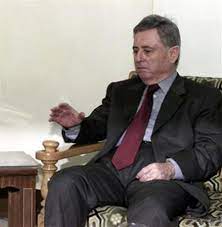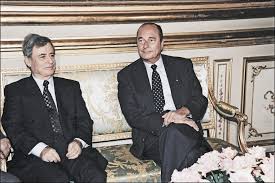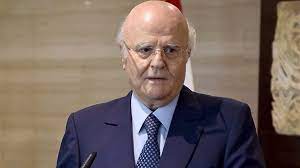Khaddam asked if our Qatari brothers could take the summit to Baghdad and form human shields or if they could gather a group of people to prevent American planes from taking off.
A group of Islamic countries agreed to hold an extraordinary summit of the Organization of the Islamic Conference on March 4th and 5th to discuss the Iraqi and Palestinian issues. However, some countries, including Saudi Arabia, Syria, and Iraq, expressed reservations about holding the summit, especially since an Arab summit was scheduled to take place on Saturday.
After a consultative meeting of leaders of Islamic countries who participated in the summit of the Non-Aligned Movement in Kuala Lumpur, Malaysian Prime Minister Mahathir Mohammad announced that all Islamic countries, with the exception of two countries, had agreed to hold the extraordinary summit.
During the consultative meeting, Syrian Vice President Abdel Halim Khaddam expressed reservations about the extraordinary summit. He questioned the purpose of the summit and asked whether it was the intention of Qatari hosts to take the summit by plane to Baghdad to form a human shield or to take the summit to Udeid airport to prevent American planes from taking off against Iraq. Khaddam also questioned what ideas the Qatari hosts had to help Iraq and suggested that military and economic assistance was not possible. He suggested that a political statement could be issued, but this was already done at the Non-Aligned Summit.
Saudi Foreign Minister Prince Saud Al-Faisal also expressed reservations about holding the extraordinary summit, saying that the Arab summit would discuss the Iraqi issue and any position agreed upon by the Arabs would be supported by all Islamic countries. An official Saudi source stated that Riyadh believed that such a conference would not lead to anything new that would benefit the current Arab and Islamic situation, especially the developments in the crisis in Iraq.
Iraq also opposed holding the summit in Qatar because of the presence of American military forces there. Iranian President Mohammad Khatami stated that he was not opposed to holding the summit in Qatar provided that it took a stand against the war on Iraq, did not provide any assistance to the United States in a possible war, and supported the French position on it. Syria, Lebanon, and Egypt supported this proposal.
According to sources in the General Secretariat of the Organization of the Islamic Conference in Jeddah, only 16 of the 57 member states have agreed to participate in the summit called by Qatar. This confirms that 27 countries have given their consent. However, a source in the Secretariat of the Islamic Summit in Doha confirmed to AFP that “memoranda have been received from 38 member states that have announced their agreement to hold the emergency session in Doha. Thus, the quorum required to hold the meeting has been completed.”
On the other hand, the Malaysian Prime Minister announced yesterday that the members of the Organization of the Islamic Conference have decided to “stand” with France, Germany, and Russia on the Iraqi crisis and are considering using oil weapons in this context. Mahathir said, “We have decided to stand by the countries that reject the war in Iraq, that is, with European countries such as France, Germany, Belgium, and Russia. There is also a proposal to consider using the oil weapon to exert pressure,” he added.
At the end of the consultative meeting, the Malaysian official said, “The matter may be very serious, as indicated by some participants, but we will not be able to exercise any influence if we do not think about this matter.”
In turn, Kuwait’s Acting Minister of Oil, Sheikh Ahmed Al-Fahad Al-Sabah, said yesterday that his country is not considering using oil as a weapon. He indicated that such a measure may prevent the peaceful resolution of the Iraqi crisis. Sheikh Ahmed was quoted by the Kuwait News Agency as saying in Kuala Lumpur, “Oil is an economic tool for us and not a weapon to fight with.” He added, “Kuwait continues to pump oil under our OPEC quotas out of our concern for the global economy.”
Mahathir pointed out that a number of participants in the Kuala Lumpur conference warned that the use of oil weapons could “derail” the situation and that they might have to pay a heavy price. But the majority think they should consider the matter. Mahathir said, “We have to think about it and not rule it out.”
Mahathir, on the other hand, announced that the 48 countries that participated in the meeting decided to send an urgent call to Iraq to fully cooperate with international inspectors to disarm weapons of mass destruction. “We agree that Iraq must comply fully with the requirements of the inspectors in their search for possible weapons of mass destruction that may have been produced or stored,” he said.
The consultative summit mandated Mahathir Mohammad to send a letter to the Secretary-General of the United Nations, Kofi Annan, containing the position of the Islamic countries against the war and calling on Iraq to continue to cooperate with the United Nations inspectors.
Mahathir said that Islamic countries will not send a fact-finding delegation to Iraq. He said that the task of verifying Iraq’s commitment to disarmament of weapons of mass destruction is the responsibility of inspectors. If these inspectors are unable to convince the world that Iraq is cooperating with the United Nations and disarming, a ministerial committee will not be able to change the opinion of those seeking war.
Qatar objected to sending a letter to the Secretary-General of the United Nations and issuing a statement from the consultative summit. It said that any statement should be issued by the emergency summit because the Kuala Lumpur meeting is a consultative meeting and should not result in statements or resolutions.
Mahathir Mohammed, who chaired the consultative meeting, said that the Iraqi and Palestinian issues were the focus of the consultative summit and that they would be the focus of the emergency summit in Doha.



